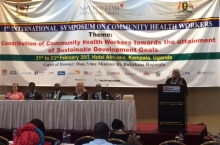First International Symposium on Community Health Workers starts in Uganda

The first International Symposium on Community Health Workers (CHWs) commenced on 21 February at Hotel Africana in Kampala, Uganda. The 3-day symposium with the theme: Contribution of CHWs towards the attainment of Sustainable Development Goals brings together over 450 policy makers, academics, practitioners, and civil society organisations in the health sector, including PSI.
The symposium will feature over 150 presentations in panels and plenary sessions, poster and video exhibitions and book launches. On Thursday 23 February, in line with the PSI Human Right to Health global campaign, PSI will be speaking on Community Health Workers (CHWs), SDGs and the Right to Health.
PSI is strongly of the view that CHWs should be well remunerated. “Volunteer” models, as the evidence shows, essentially fosters the pauperisation of CHWs. As the PSI General Secretary, Rosa Pavanelli notes:
The idea of CHWs as volunteers is often nothing but a white lie. They provide services as frontline health workers in underserved, often rural settings, working many hours as fulltime workers. How then can we describe them as “volunteers”? How are they expected to meet their needs and those of their family members with dignity, if they have to rely on expected gift items from the communities they serve? This model is not acceptable. It undermines every single principle of decent work and social justice. PSI thus supports the ongoing CHWs guidelines development efforts of the WHO, which we are contributing to. With universal guidelines that promote adequate training and remuneration, the roles of CHWs will definitely be enhanced.
It is encouraging that this mode of thinking is now becoming generalised. During the opening session of the symposium, Ugandan Minister of State for Primary Health Care Dr Joyce Moriku informed participants that the country’s Village Health Teams (VHT), which is a “volunteer” scheme for full-time but unpaid CHWs will soon be replaced with a new Community Health Extension Workers (CHEW) scheme. 15,000 CHEWs who are presently amongst the VHT “volunteers” will commence training within the next few months.
Dr David Musoke of the Makerere University’s School of Public Health Sciences stressed the need for debate on this and other issues, pointing out that the symposium was conceptualised as a platform for discourse that would help shape the narrative, and policy formulation process on CHWs, globally and within different countries. The symposium will be a biennial conference which would be hosted in different countries in partnership with the academia, international organisations and other stakeholders in the health sector. Dr Linda Gibson from the Nottingham Trent University also stressed the need for an interdisciplinary approach in the debates at the symposium in order to address the different challenges and opportunities.
The 1st Deputy Prime Minister of Uganda, General Moses Ali who was a special guest of honour at the opening session expressed the view that the symposium was coming up at an opportune time and would help people appreciate the important roles of CHWs for attaining universal health coverage. He also noted that CHWs serve as critical links between the population and the health system in Uganda.
The keynote address was presented by Professor Francis Omaswa of the African Centre for Global Health and Social Transformation (ACHEST). He called for a return to the spirit of the Alma Atta declaration of 1978 which stresses health as a fundamental human right that governments must respect. This, he insisted, entails providing universal access to quality health, but shouldn’t be limited to that. Food, housing and all other social determinants of health have to be made available for the full realisation of the right to health.
Community health workers being at the frontline of delivering primary health care services in many countries across the world, particularly in the Global South, will help foster a better future for all, with the realisation of the human right to health. The roles of CHWs as agents of preventive and promotive health can definitely not be overemphasized.

